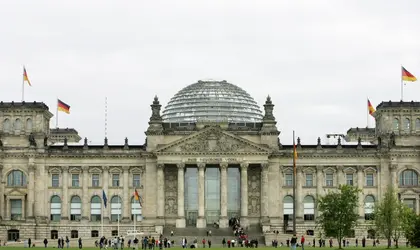It seems paradoxical, given the immensity of the disaster from which the continent was emerging, but 1945 was a year of utopian optimism in Europe. At Yalta, it was agreed that the ruins of Berlin would be the setting for an experiment in the dream of “One World” government, a capital jointly administered by the three powers of the Grand Alliance (plus France). If they could collaborate in the reconstruction of one city, perhaps they could work together, also, on the larger project of the economic and spiritual recovery of Europe. This, at least, was the vision cherished by Franklin D. Roosevelt, who did not live to witness its failure.
Stalin nursed Roosevelt’s illusions, but was interested only in extending Soviet power in Europe. In pursuance of a Soviet “sphere of influence,” he had first made a Pact with Hitler in 1939. After the War, he finally obtained that influence, by deceiving Roosevelt into believing that he would help Eastern Europeans hold elections. Stalin calculated that Berlin – geographically isolated from the western German regions under American, British and French protection – would eventually be abandoned by the democratic powers.
JOIN US ON TELEGRAM
Follow our coverage of the war on the @Kyivpost_official.
Berliners, though, were not about to submit to Soviet domination. In the 1920s, their city had been the spiritual capital of the Weimar Republic, home of modernist architecture and avant-garde art, and a magnet for writers, actors and film directors from all over Europe. For its internationalism and its cultural inventiveness, the Nazis detested Berlin, branding it the “sewer of the Reich.” Hitler planned to destroy most of the existing city – to sweep away any remnants of its “degenerate” past – and build his totalitarian Germania over its ruins. Accordingly, Berlin had been one of the most anti-Nazi cities in Germany (and the only city in which a public protest was held against the deportation of Jews). Its citizens had lived under totalitarianism once, and were determined not to relive the experience.

Belarus Sentences German Man to Death for 'Mercenary Activity'
In the Soviet zone of Germany, Nazi concentration camps like Buchenwald were reopened as a solution to the problem of political opposition. As in Czechoslovakia and Hungary, the Communist Party also set about merging with other parties through a mixture of threats and intimidation. By such a shotgun marriage, the Socialist Unity Party (SED) – which would rule Eastern Germany until 1989 – was formed in 1946, enabling the communists to abolish the Social Democratic Party (SPD).
In the four-power city of Berlin, however, where the Soviets couldn’t simply liquidate their political opponents, the SPD was able to run – and win a landslide victory – in the Council elections of October 1946. The results were an embarrassment for the SED, which came a distant third. The Soviets responded to this defeat by intimidating the SPD Mayor, Otto Ostrowski, into collaboration. After Ostrowski was caught holding secret meetings with the SED, his own Party submitted a vote of no confidence in him, forcing his resignation in April 1947. In a surreal intervention, the Soviets, who had vehemently opposed Ostrowski’s appointment in 1946, now attempted to veto his resignation – alleging political interference by the Western powers!
The person elected to replace Ostrowski as SPD Mayor was Ernst Reuter. Reuter had been imprisoned in Lichtenberg by the Nazis in 1934, but had escaped, crossed the German-Dutch border on foot, and ended up in Turkey, where he learned the language, established himself as a city planner, and remained until the end of the Second World War. He had gained his first political experience, however, many years earlier, in Soviet Russia.
Born in Prussia in 1889, Reuter became a socialist after the outbreak of War in 1914, but was conscripted to fight on the Eastern Front, where he was captured by the Russians in 1916. Initially sympathetic to the Bolsheviks, Reuter taught himself Russian and was freed after the October Revolution. Impressed by the new German recruit to the cause, Lenin appointed Reuter as Commissar for the Volga German region in Saratov, which had been settled by German migrants during the Westernizing period under Peter the Great. Reuter’s immediate superior was the Commissar for Nationalities, a Georgian named Iosif Vissariónovich Dzhugashvili, later known to the world as Stalin.
Reuter and Stalin despised one another, which was probably the main reason Reuter was swiftly sent back to Germany, where he briefly served as General Secretary of the Communist Party. Soon, however, Lenin began to develop concerns about Reuter (incidentally, identical to those he developed about Trotsky). He was, Lenin wrote, “too independent” – the worst thing a Bolshevik could be. The whole personality, as Lenin’s hero Nechaev had insisted, must be sacrificed to the Party. In December 1921, after stating his opposition to the “fundamental immoralism of the Comintern,” Reuter was expelled.
When the ex-communist Reuter was elected Mayor in 1947, the Soviets were apoplectic. The Western powers had refused Soviet efforts to veto Ostrowski’s resignation, since it would have been absurd to force someone to continue to serve as Mayor against their will. But they were still laboring under the erroneous belief that they and Stalin were allies. Eager to appease him, they caved to a Soviet veto of Reuter’s appointment.
The Soviets justified their veto on the grounds that the survivor of Lichtenberg and refugee from Hitler’s Germany was a “Nazi,” the same absurd accusation that the current Russian regime makes against the government of the Jewish President of Ukraine. Then, as now, the slander was a reflex of the Moscow leadership’s view that Nazism was nothing more than an episode in the long history of the West’s “war against Russia.” Thus, Reuter and Zelensky’s preference for cooperation with their democratic neighbors to the west, instead of domination by their totalitarian neighbors to the east, was understood by Stalin, as it is today by the paranoiac Putin, as a sinister plot with existential implications for Russia.
In fact, the leadership of Reuter was an existential threat to Soviet totalitarianism. “What happens to Berlin,” as Molotov, Stalin’s Foreign Minister, recognized, “happens to Germany; and what happens to Germany, happens to Europe.” Ribbentrop’s business partner never spoke a truer word, and it was Reuter who convinced General Lucius Clay, leader of the American Military Government (OMGUS), of Molotov’s prescience. “If we can hold the dam against the flood of slavery here,” Reuter once said, “we will prove that it can be staved off everywhere.”
When the Soviets blockaded West Berlin, attempting to starve its citizens into submission, and reckoning on the city’s abandonment by the United States, it was Reuter who put the idea of an airlift to Clay. The General was skeptical about the fortitude of the Berliners. Unless they were prepared to persevere, he wouldn’t help them. Reuter, however, knew that it wasn’t the perseverance of the Berliners that was in question – it was that of their Western allies.
Among Western intellectuals, very few of whom had any overt Soviet sympathies, ran the common refrain that “democratic freedoms meant little to people without bread.” It was a cliché which signaled a profound ignorance of German realities. Almost everyone in Berlin knew someone who had one day disappeared in Soviet Germany; and, in any case, Berliners could see with their own eyes that East Germans had neither freedom nor bread.
When, after the beginning of the Blockade, at a demonstration organized outside the ruins of the Reichstag, Reuter addressed the Berlin crowds, it was not to them that he felt compelled to speak. Instead, Reuter addressed his remarks, imploringly, and on Berlin’s behalf, to the wavering leaders and publics of the democracies. “You peoples of the world, you people of America, of England, of France, look on this city, and recognize that this city, this people, must not be abandoned!”
With the Blockade, the city was effectively divided in two. The Soviets appointed a mayor of their own for East Berlin and Reuter romped to victory in the West Berlin mayoral election of December 1948, his 65 percent share of the vote proof that Berliners wanted freedom, even when they hardly had bread.
Apposite today is a conversation Reuter once had with a skeptical American college professor, who visited Berlin during the Blockade. “You are in a terrible spot here,” the professor told him. “When the Russians decide to grab Berlin, it will be impossible for you to resist them.” “But to resist them,” Reuter replied, “is the only thing possible for us.” Then, after a pause, he added, “that’s why the Russian’s won’t grab this city.”
Last year, when the Russians launched their invasion of Ukraine, there were many in Europe who believed that the Ukrainian cause was a hopeless one; and that the country could not possibly hold firm against the Russian onslaught. Like Reuter in Berlin, Zelensky played the crucial role of spokesperson for Ukrainian courage in the West. In response to Clay’s concerns about the fortitude of the Berliners, Reuter bluntly instructed him to “ask Washington for more planes.” Zelensky’s message is the same: “We have freedom, give us wings to protect it.”
You can also highlight the text and press Ctrl + Enter






